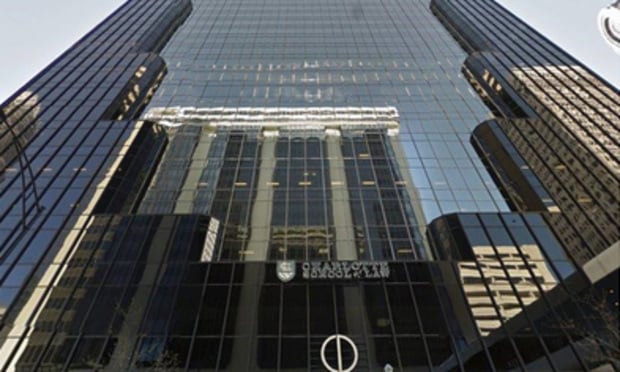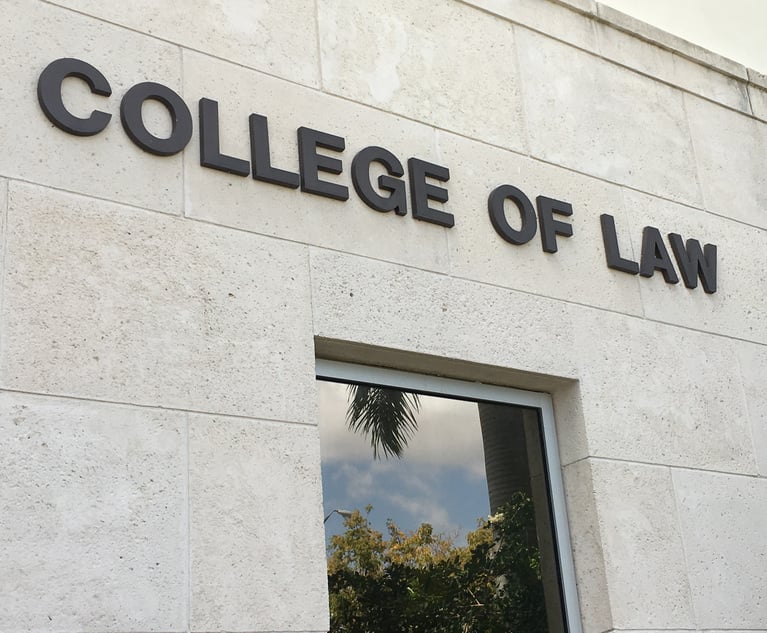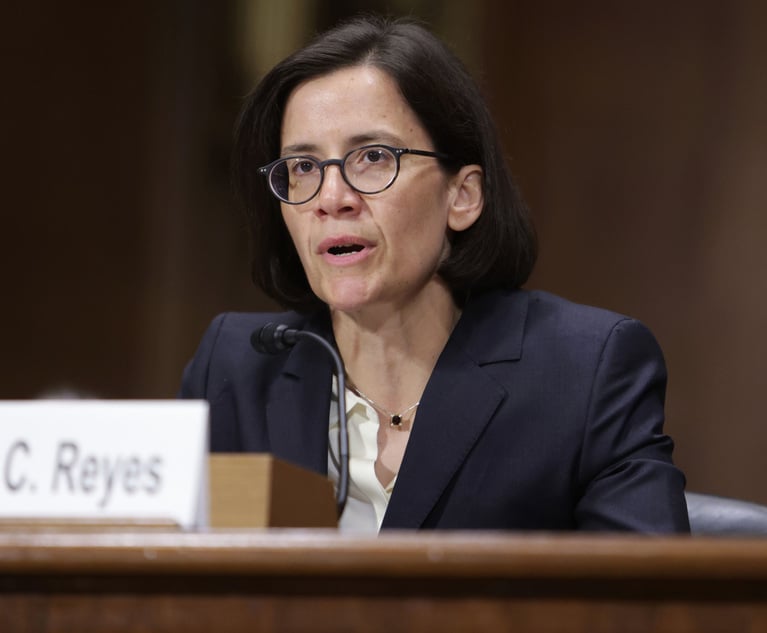4th Circuit Affirms Charlotte Law School's Deal to Pay Former Students $2.65M
It would have taken more than $100 million to even refund a year of tuition for all the students who were unable to complete their law degrees, objectors argued. But those who brokered the agreement said they pulled in every dollar on the table.
June 12, 2020 at 08:12 PM
5 minute read
 Charlotte School of Law in Charlotte, North Carolina.
Charlotte School of Law in Charlotte, North Carolina.
The U.S. Court of Appeals for the Fourth Circuit has affirmed a $2.65 million class action settlement between the now-closed Charlotte School of Law and former students—some of whom had appealed the deal because they said it was not enough.
It would have taken more than $100 million to even refund a year of tuition for all the students who were unable to complete their law degrees, their attorneys argued. But those who brokered the agreement said they pulled in every dollar on the table.
On Thursday, a panel of three judges affirmed U.S. District Judge Graham Mullen of the Western District of North Carolina in approving the agreement. U.S. District Judge Rossie Alston Jr. of the Eastern District of Virginia wrote the opinion, sitting in at the Fourth Circuit. Alson was joined by Fourth Circuit Judges J. Harvey Wilkinson III and Barbara Milano Keenan.
"Defendants funded the settlement with $2,650,000.00, which was derived from the following two sources: a $2,500,000.00 portion of an insurance policy and a $150,000.00 institutional contribution. After a meticulous review, the district court ultimately approved the limited fund settlement," Alston said in the appeals court's opinion.
"We conclude that the district court did not abuse its discretion in approving the limited fund settlement. We further find that the district court did not abuse its discretion by ultimately determining that the settlement was fair, reasonable, and adequate pursuant to Federal Rule of Civil Procedure 23(e), and in denying a motion for discovery, largely concerning Defendants' ability to fund the settlement. Accordingly, we affirm the district court's decisions in full."
Mullen approved the settlement in January, 2019, ending two years of litigation. Current and former students had filed four federal and 90 state court suits alleging they were kept in the dark about the school's accreditation troubles. The American Bar Association warned the school of problems in 2014, but that was not disclosed publicly until the fall of 2016. Afterward, the U.S. Department of Education ended the school's federal loan eligibility. The school closed its doors in August of 2017.
Anthony Majestro of Powell & Majestro in Charleston, West Virginia, is the class counsel and helped negotiate the settlement.
"We're very pleased," Majestro said Friday. "The panel agreed with the trial judge on everything. Hopefully, this will put an end to the ligation, and we'll be in a position to start paying the students."
Because of the limited resources available, Majestro said the attorneys agreed to cut legal fees to 15%, rather than the third that is more customary for class actions. "We knew everyone was not going to be made whole," he said.
Kyle Nutt of Wilmington, North Carolina, represented some of the class objectors who appealed. He was with Shipman & Wright when the litigation began, but is now with Reiss & Nutt.
Nutt said Friday he plans to ask the full court to rehear the appeal en banc. He said Alston's opinion did not address one of his key arguments—regarding intra-class conflicts. "That issue deserves to be addressed," he said.
David Mills with Cooley in Washington, D.C., represented the school and it's owner, InfiLaw.
"We are pleased the Fourth Circuit has affirmed the district court's approval of the class-wide settlement in a thorough and thoughtful opinion," Mills said Friday. "We look forward to seeing the settlement fund disbursed to the claimants."
The class covers any students who attended Charlotte Law between September of 2013 and August 2017—or about 2,500 students, according to the initial settlement motion filed in September.
The settlement would need to be $105 million just to refund the entire class for one year of tuition, attorneys opposing it said in pleadings. It's unclear how much each class member will receive. Payments will be determined by a number of factors, including how long claimants attended, whether they transferred, and whether they qualified to have their federal loans discharged through the Education Department.
An important part of the settlement is that it preserves the rights of former Charlotte students to have their federal loans discharged through the Education Department's closed-school discharge program or its borrower defense of repayment program, which allows defrauded students to discharge their loans, according to attorneys who negotiated the terms. Charlotte School of Law was established as a private, for-profit law school in 2006, and was accredited by the ABA in 2011. An ABA "site team" visited CSL in March 2014 and conducted a "three year interval evaluation." The report that followed noted failures to comply with ABA standards for curriculum, Alston said.
"CSL allegedly did not make the required disclosures and made representations seemingly to the contrary of the ABA's findings through public statements," Alston said. "CSL's license to operate granted by the University of North Carolina Board of Governors expired on August 10, 2017."
This content has been archived. It is available through our partners, LexisNexis® and Bloomberg Law.
To view this content, please continue to their sites.
Not a Lexis Subscriber?
Subscribe Now
Not a Bloomberg Law Subscriber?
Subscribe Now
NOT FOR REPRINT
© 2025 ALM Global, LLC, All Rights Reserved. Request academic re-use from www.copyright.com. All other uses, submit a request to [email protected]. For more information visit Asset & Logo Licensing.
You Might Like
View All
Justified Termination Does Not Bar Associate Attorney From Unemployment Benefits, State Appellate Court Rules
5 minute read
Florida Law Schools Are Seeing a Bump in Applications for 2025, After Recent Declines at Flagship Schools
3 minute read
Federal Judge Warns of 'Serious Sanctions' on FDIC Over Document Retention
3 minute read
Hogan Lovells, Jenner & Block Challenge Trump EOs Impacting Gender-Affirming Care
3 minute readLaw Firms Mentioned
Trending Stories
- 1There's a New Chief Judge in Town: Meet the Top Miami Jurist
- 2RIP DOJ FCPA Corporate Prosecutions
- 3Federal Trade Commission’s Updates to the Health Breach Notification Rule Now In Effect
- 4I’m A Lawyer, What Can I Sell?
- 5Internal GC Hires Rebounded in '24, but Companies Still Drawn to Outside Candidates
Who Got The Work
J. Brugh Lower of Gibbons has entered an appearance for industrial equipment supplier Devco Corporation in a pending trademark infringement lawsuit. The suit, accusing the defendant of selling knock-off Graco products, was filed Dec. 18 in New Jersey District Court by Rivkin Radler on behalf of Graco Inc. and Graco Minnesota. The case, assigned to U.S. District Judge Zahid N. Quraishi, is 3:24-cv-11294, Graco Inc. et al v. Devco Corporation.
Who Got The Work
Rebecca Maller-Stein and Kent A. Yalowitz of Arnold & Porter Kaye Scholer have entered their appearances for Hanaco Venture Capital and its executives, Lior Prosor and David Frankel, in a pending securities lawsuit. The action, filed on Dec. 24 in New York Southern District Court by Zell, Aron & Co. on behalf of Goldeneye Advisors, accuses the defendants of negligently and fraudulently managing the plaintiff's $1 million investment. The case, assigned to U.S. District Judge Vernon S. Broderick, is 1:24-cv-09918, Goldeneye Advisors, LLC v. Hanaco Venture Capital, Ltd. et al.
Who Got The Work
Attorneys from A&O Shearman has stepped in as defense counsel for Toronto-Dominion Bank and other defendants in a pending securities class action. The suit, filed Dec. 11 in New York Southern District Court by Bleichmar Fonti & Auld, accuses the defendants of concealing the bank's 'pervasive' deficiencies in regards to its compliance with the Bank Secrecy Act and the quality of its anti-money laundering controls. The case, assigned to U.S. District Judge Arun Subramanian, is 1:24-cv-09445, Gonzalez v. The Toronto-Dominion Bank et al.
Who Got The Work
Crown Castle International, a Pennsylvania company providing shared communications infrastructure, has turned to Luke D. Wolf of Gordon Rees Scully Mansukhani to fend off a pending breach-of-contract lawsuit. The court action, filed Nov. 25 in Michigan Eastern District Court by Hooper Hathaway PC on behalf of The Town Residences LLC, accuses Crown Castle of failing to transfer approximately $30,000 in utility payments from T-Mobile in breach of a roof-top lease and assignment agreement. The case, assigned to U.S. District Judge Susan K. Declercq, is 2:24-cv-13131, The Town Residences LLC v. T-Mobile US, Inc. et al.
Who Got The Work
Wilfred P. Coronato and Daniel M. Schwartz of McCarter & English have stepped in as defense counsel to Electrolux Home Products Inc. in a pending product liability lawsuit. The court action, filed Nov. 26 in New York Eastern District Court by Poulos Lopiccolo PC and Nagel Rice LLP on behalf of David Stern, alleges that the defendant's refrigerators’ drawers and shelving repeatedly break and fall apart within months after purchase. The case, assigned to U.S. District Judge Joan M. Azrack, is 2:24-cv-08204, Stern v. Electrolux Home Products, Inc.
Featured Firms
Law Offices of Gary Martin Hays & Associates, P.C.
(470) 294-1674
Law Offices of Mark E. Salomone
(857) 444-6468
Smith & Hassler
(713) 739-1250








